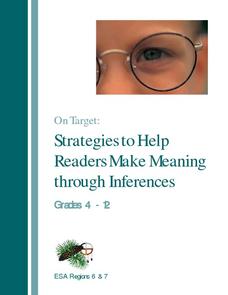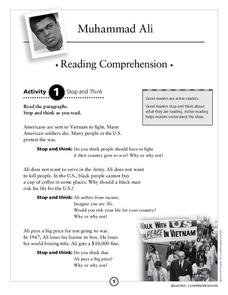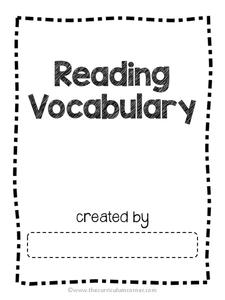K12 Reader
What Do You See? (Inferences)
Making inferences is a skill that goes beyond the comprehension of written text. In this simple exercise, young learners are provided with a photograph and asked to answer a series of inference questions using only on the information...
Pearson
Making Inferences
The ability to make inferences is an important skill. Provide your class with some practice. This resource includes several different passages with which learners are required to practice inferring. They read each passage and respond to...
City College of San Francisco
Making Inferences: Reading Between the Lines
Have you ever read part of a story and had to figure out what the rest was about? Practice making inferences with several short passages and multiple choice questions.
Bethel School District
Observations and Inference
What's the difference between qualitative and quantitative observations? Learners make observations, inferences, and predictions about their environment with a set of questions and activities that are applicable to either language arts...
Curated OER
On Target: Strategies to Help Readers Make Meaning through Inferences
Here's a resource that explicitly teaches, models, and provides readers with opportunities to practice the process of drawing inferences from text. Packed with strategies elementary, middle, and high school teachers can use, the resource...
K12 Reader
Inference Practice: Where Am I?
Have your pupils try a hand at making inferences. The worksheet includes five different descriptions, and learners must infer where they think the passage is happening and provide some explanation. A straightforward resource for...
Greater Clark County Schools
Observations and Inferences
A cartoon from the far side of Gary Larsen's wacky world provides an opportunity for critical thinkers to practice their skills distinguishing between observations and inferences. What fun.
K12 Reader
Visual Clues
Whether you realize it or not, reading an image and reading a text require similar skills, including the ability to make inferences. For this simple worksheet, children look at a picture of a snowy winter day and answer a series of...
Polk Bros Foundation
I Can Infer Predictions Based on an Analysis of Motive
Use a character or person's motivation as the basis for a prediction of that character or person's next action. Pupils select an individual from their reading, copy a quote, write down an inference about that character's motives, and...
Polk Bros Foundation
Comprehensive Nonfiction Reading Questions
Analyze any nonfiction text with the set of questions on this sheet. Class members practice inferring by noting the main idea and purpose of a passage. They also analyze an opinion in the passage and write a brief summary. See the...
Polk Bros Foundation
I Can Infer Motive and Effects for an Action
Help your pupils determine just what makes a character or person tick by zooming in on one character or person. This graphic organizer is dedicated to analyzing one person and asks pupils to infer a personality trait, note down an action...
Polk Bros Foundation
I Can Infer Motives
Why did they do it? Get to the bottom of complex characters and people by analyzing their motivation. Learners select an action and take a close look at that action in order to infer motive. They then explain why they determined that...
Polk Bros Foundation
I Can Analyze Cause and Effect
Examine cause and effect by asking pupils to fill out a basic graphic organizer. The template is for any story or event and provides a line for writing in the story or event title. Pupils write in two causes in the circles and the change...
Polk Bros Foundation
I Can Infer the Main Idea When I Read
While reading any text, ask your pupils to keep this graphic organizer on hand. They can note down the main idea and three supporting details during or after reading. The instructions allow for individuals to use words or images to...
Library of Congress
Muhammad Ali
Muhammad Ali was the greatest, as he'd tell you himself. A set of reading comprehension worksheets walks through parts of Ali's life and promotes individuals to become good readers and writers.
K12 Reader
What Happens Next?
While your students may not be psychics, that doesn't mean they can't predict what will happen next in a story. To hone this important reading comprehension skill, young learners read a series of three short passages before writing a...
Curriculum Corner
Academic Reading Vocabulary
From A to Z, learners define, draw, and find examples of specific reading focus skills in an alphabetized reading vocabulary packet. Words include dialogue, theme, text structure, genre, paraphrase, and many more.
Polk Bros Foundation
I Can Locate and Classify Information About a Topic
After reading a text, ask your pupils to recall and organize what they've just learned into a blank three-column chart. Class members write the topic and fill in the columns with information. The sheet also prompts students to write a...



















